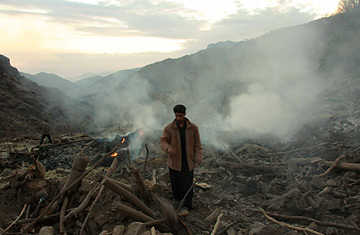
A villager walks through rubble in Qlatooka, near Iraq's border with Turkey on Sunday, Dec. 16, 2007. Turkish war planes bombed Kurdish rebel targets inside northern Iraq on Sunday.
The official U.S. line is that Washington did not approve Turkey's Sunday air strike on Kurdish targets in northern Iraq. But the U.S. does control the skies over Iraq and the Pentagon did open airspace over Iraq for at least three hours to Turkish warplanes. It was also informed of the raids beforehand, according to an American spokesperson in Ankara. "By opening its airspace, America gave its approval to the operation," Turkish General Yasar Buyukanit said. He also said U.S. intelligence provided targeting information for the attack. The U.S. may not have formally approved Sunday's operation, but it did everything short of that. In fact, the raids "show a degree of tactical cooperation between the U.S. and Turkey that we have not seen since the beginning of the Iraq war," according to Mark Parris, a former U.S.ambassador to Turkey now at the Brookings Institution in Washington D.C. Turkey sent another 300 troops across the border on Tuesday. Washington may see such raids as the best way to prevent tensions between Turkey and Iraq from spilling over into a broader conflict.
Turkish leaders say they were pleased with the air strike, the first by Ankara's warplanes on Kurdish targets in northern Iraq since Turkey passed a resolution approving such cross-border raids to pursue militants of the Kurdistan Workers Party (PKK) back in October. The PKK has been waging a separatist campaign against Turkish security forces since the 1970s, most recently attacking Turkish targets from bases within Iraq. On Sunday, the PKK said five of its militants were killed; according to Iraqi officials, at least one woman civilian was killed as well. Meanwhile, hundreds have been forced to flee their homes. "This operation, which was carried out under night conditions, was a success," the Turkish Prime Minister, Recep Tayyip Erdogan, said. The Turkish struggle against the PKK "will continue inside and outside Turkey," he added. But Iraqi officials have denounced the raids, summoning the Turkish ambassador in Baghdad for consultations and calling for a cessation of attacks that "cause harm to innocent people."
Turkey has been urging the U.S. to help crack down on PKK militants inside Iraq itself since 2003 (the U.S. State Department classifies the PKK as a terrorist organization). Those calls became more urgent following the rash of attacks last October by PKK militants that left some two dozen Turkish soldiers dead in the course of two weeks, resulting in public outrage in the streets of Turkey's cities. The U.S. declined to send its own troops. And so too did the Iraqi Kurdish administration. The crisis placed the U.S. in a diplomatic and strategic vice between two of its closest allies in the region.
However, following a meeting between Turkish Prime Minister Erdogan and President Bush at the White House on November 5, the U.S. pledged to provide ongoing intelligence to Turkey to aid in that country's pursuit of "a common enemy." The President, said a U.S. embassy spokesperson in Ankara, "made a commitment to enhance our cooperation by intelligence sharing and we are doing that and we will continue to do that."
Analysts say the weekend operation, which took place before dawn on Sunday, appears to have been triggered by intelligence on the whereabouts of key Kurdish targets and is probably not the beginning of a wider offensive. Nevertheless, it was by far the largest Turkish incursion to date. Previous operations over the past six weeks have involved some cross-border shelling and, in one case, helicopter attacks. This was the first to include warplanes. With up to 50 aircraft involved, it was also one of the largest Turkey has launched in years. The operation targeted several villages near the Turkish border and in the Qandil mountains, about 60 miles from the Turkish frontier, straddling the border between Iraq and Iran. Turkish newspapers reported that a PKK commander was killed in the raid, but that report could not be confirmed. Turkey said it chose its targets "with sensitivity" based on intelligence that there were no civilians in the area. "Broadcasts that civilians were fired on " said General Buyukanit, only "serve the purposes of the PKK terrorist organization."
The Turkish government had been threatening to send its own troops across the border to crack down on PKK bases inside Iraq since last October's attacks on Turkish troops. Washington and Baghdad at the time urged restraint, fearing that a large-scale incursion into Iraq by Turkish troops would trigger a broader clash not with the PKK but with soldiers under the command of the Iraqi Kurdish administration, thus destabilizing the one part of Iraq that has managed to avoid civil conflict so far.
Now, says Parris, "the U.S. has finally closed the gap between what we have been saying about the PKK and what we are actually doing." Turkish editorial views of U.S. policy has markedly improved in recent weeks. Turkey for its part has found a way to ease public pressure to act without raising the risk of a wider conflict. But while the attacks appear to be achieving a diplomatic objective, the military goal of rooting out the PKK from the high mountains of northern Iraq will likely prove a good deal more elusive.
